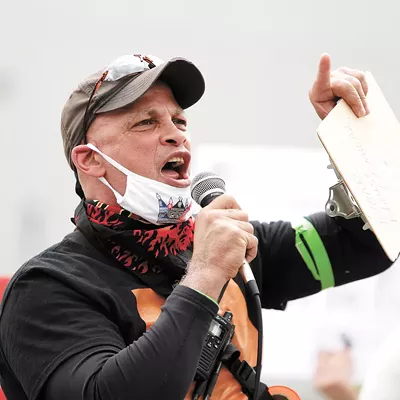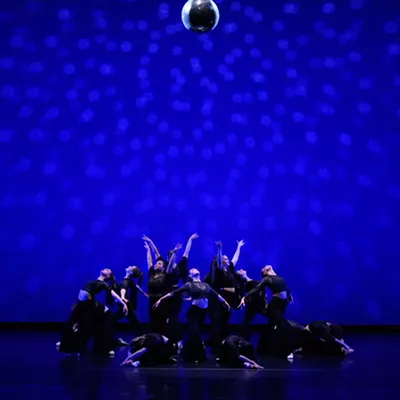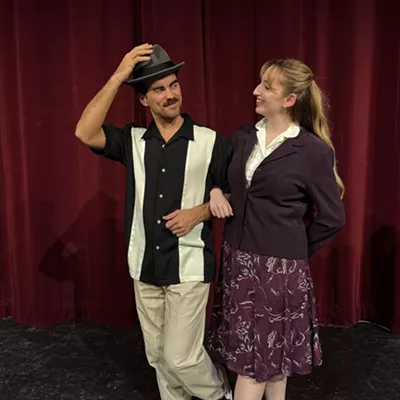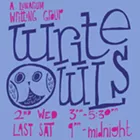You can see Carl Maxey in his two sons, and you can’t. He’s there in Bevan Maxey’s national-caliber athleticism, in his son’s locker-room swagger and easy demeanor. He’s there in the casual way Bill Maxey’s left lip curls slightly to meet a joke he has heard.
Maxey is there in the men’s career choice (law) and in their pursuit of excellence, which keeps Bill working deep into the evening and causes Bevan’s internal alarm — spring-loaded with worry — to shake him awake at night. The brothers have also their father’s sense of duty and his disdain for failure.
This sense of duty causes Bevan to wonder — as his father did — if he has done enough to make things better.
There are the ways the two try to improve upon the man’s good deeds — Bevan tries to spend more time with his children than his father was able to spend with him — and there are the ways in which they could not improve upon Carl Maxey if they tried.
No matter what, neither Bill nor Bevan Maxey will ever be:
The first black lawyer in Eastern Washington to pass the state bar.
A collegiate national champion light-heavyweight boxer.
An anti-Vietnam-War candidate for U.S. Senate.
The man the New York Times credited “with virtually singlehandedly desegregating much of the inland Northwest.”
They will never have the fire of an orphan. They will never know the shame or rage that comes with being denied service at lunch counters.
Like their father, they are people of color, but they are not, strictly speaking, black. Their mother, Ninon, is a white woman originally from Ashland, Ore., whom Carl met while at the University of Oregon. Whether the brothers' mixed heritage has made their life easier or more difficult is “tough to tell,” Bill says.
If the brothers had their way, there would be no comparison. “No one is ever going to be like Carl,” Bill says. But people always compare fathers to sons.
Paul Mack, a former prosecutor now in private practice in downtown Spokane, tried his first case against Carl Maxey 26 years ago and has worked both collaboratively with Bill on personal injury cases and against Bevan in divorce court. Mack lauds Bill’s diligence and Bevan’s sharp-mindedness, and says they treat the law as a calling rather than a business. “They are both very good at what they do,” Mack says, adding in the same breath, “They have big shoes to fill.”
“They are such wonderful men,” says former Spokane Mayor Shari Barnard, who considered Carl Maxey a personal mentor. “They haven’t been in the public eye the way their father has.”
The Maxey brothers have have taken up many of the same causes — economic equality and social justice — but they’ve done so more often from the boardroom than the bully pulpit. Carl Maxey worked his will on the world at a time of tremendous social change. His sons have lived in the aftermath.
As a result, the Maxey brothers occupy a unique place in the world that is partially given and partially earned. It has something to do with their race and something to do with their family name and something to do with pure human ambition.
The place they occupy has to do with a lot of things, not the least of which is the fact that their father had, in his own words, started from “black scratch.”
Carl Maxey had his troubles in school. He had gotten a late start. He loved to read and was a diligent student but struggled throughout college. Speaking was never an issue, though. A born fighter — he’d win the national light-heavyweight boxing championship for Gonzaga in 1950 — Maxey loved to spar verbally. He became a student of rhetoric, and he understood, Bevan says, the knockout force of a potent idea.
Bevan says he learned from his father how to pull quotes from classic literature and use them to good effect in the courtroom. (A plaque with Robert Frost’s words about diverging roads sits atop a shelf at Maxey Law.) The concept of “black scratch,” however, was a Carl Maxey original.
The idea is that if you are born to absolutely nothing in the world, that is difficult enough. But if you are born to absolutely nothing in America, and you are black, that is a whole other kind of hard-up.
Author Jim Kershner, in his biography Carl Maxey: A Fighting Life, likens “black scratch” to starting from Square 0. Maxey may have argued, in his darker moments, that it was starting at Square -1. He didn’t just grow up at a disadvantage to whites; he grew up as the sometimes-sole target of their distaste for black people.
Born in Tacoma in 1924, Maxey never knew his parents and was put into the Spokane Children’s Home at age 5 by his adoptive mother, Carolyn, after his adoptive father, Carl Sr., ran off. Carolyn died of heart failure when Carl was 8, and he remained a ward of the county.
The Children’s Home was Dickensian and, at times, verged on sadist. Milton Burns was the only other person of color in the place (he was mostly Native American, but everyone considered him black). Burns recounted to Kershner stories of nighttime beatings by the facility’s assistant superintendent. Eventually, it came to light that the superintendent and later the assistant had sodomized a number of boys in the home. Maxey said he was never touched. Burns said he hadn’t been either, but later thought he might have repressed the memory. It was at the orphanage, his first wife would say, that Maxey lost his fear of the establishment. Maxey believed it was one of the places he got his fire.
That fire took him places, eventually, but first he was sent to jail. Within a year of the sodomy scandal, the Ladies Benevolent Society, which ran the Children’s Home, voted to kick Maxey and Burns out. (Maxey suspected the ladies were trying to sweep the pedophilia mess under the rug.) The minutes from the society’s meeting, as quoted by Kershner, read matter-of-factly:
“It was moved ... that the two colored boys, Carl Maxey and Milton Burns, be returned to the County, having been in the home for years. Motion carried. It was moved ... that the Board go on record as voting to have no more colored children in the Home from this time forward.”
With his mother dead and his dad nowhere to be found — and Milton Burns in similar straits — the county decided to house the boys at the Juvenile Detention Center. They spent a year in an annex of the Spokane County Courthouse, schooled at Audubon Elementary by day and locked up with the delinquents at night.
It says something about Maxey’s lot that the first place he considered home was a Catholic mission school for Indian children on the poverty-stricken Coeur d’Alene Indian Reservation. He was sent there after Father Cornelius Burns saw him in juvie and offered to take he and Milton off the county’s hands. Maxey would thrive at the reservation — learning to box, picking up other sports, developing a love for reading and a Jesuit sense of social justice — and come to view the priest as a surrogate father figure.
In A Fighting Life, Lou Maxey, Maxey’s second wife, says the school had had sports teams before, but never won anything until Maxey came along. Despite this prowess, he wasn’t afforded star treatment in the racially tense North Idaho Panhandle.
Prior to his first football game in Wallace, someone in town hung a sign that read, “Nigger, see this sign and run.” He spent the night at the sheriff’s house and then won the game the next day.
After graduating from Gonzaga High School, Maxey entered the Army as a private in the medical battalion. He credited the racism and segregation he encountered in the service with adding fuel to his burgeoning social awareness. He decided to become a lawyer after coming home to Spokane and promptly being denied service at a local cafeteria — despite standing in full Army dress.
Maxey went to college at the University of Oregon and law school at Gonzaga. During his career, Maxey would integrate clubs by threatening to take away the liquor, and barber shops by threatening to rescind their licenses. He would strong-arm Spokane’s school board into hiring the district’s first black teacher. He became famous for being able to achieve results by simply threatening to sue and made good money by helping make the world more fair to rich, white women divorcing their rich, white husbands.
The husband in such cases would retain a country club lawyer. The wives increasingly found Maxey, who developed a reputation for squeezing every cent out of a divorce settlement. “I can’t tell you, as I grew up, how many people have come and say, ‘Your dad represented my mom,’” Bevan says.
Bevan says his own divorce practice, which takes up about half his time, is more equitably split between the sexes. The one exception to that continues to be with rich, white women. “The men still have their country-club guys,” he says.
For Carl Maxey, even divorce was a matter of equality. Bevan says his father would paraphrase the iconic lawyer Clarence Darrow: even the rich have rights.
Before any of that, though, Maxey had to graduate law school, which proved difficult for him. He was a devoted student but was hampered by his spotty early education and the distractions of the boxing ring. And of course, there was the fact that, in the middle of law school, his first son, Bill, came along.
Bill and Bevan Maxey’s lives have not been their father’s. Carl and Ninon made sure of that.
When Bill was in grade school and Bevan was an infant, the young family moved from southeast Spokane near Grant Elementary — about as diverse a neighborhood as Spokane has — and into a split-level on F Street near Finch Arboretum. To Bill’s recollection, they were the first non-white family in the neighborhood.
Neither son remembers specifically speaking with their father about why they moved, but Bevan says he thinks it was part of a desire in his father “to establish some precedent that there can be successful black men and women, [and that they] can be incorporated in other parts of society.” Not just the black parts of town.
While Carl Maxey may have wanted to make a larger point when deciding things like where to live, his sons have not.
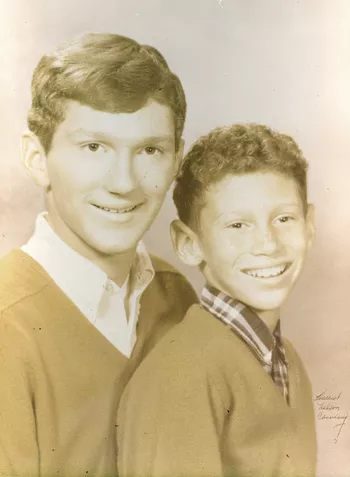
When Bevan bought his house on Spokane’s South Hill, “I just needed a house.” And though it has been a home for his family, he has come to regret the decision in one sense. The house sits in a neighborhood that feeds Ferris High School, not Lewis and Clark, the school where he and Bill were star athletes. “I guess I should have paid more attention,” he says, laughing, while taking care not to cast aspersions on Ferris. “I still have two kids there.”
And while their father kept a mental ledger of specific incidents of hate and bias to his dying day, his sons have a hard time pinning single, discrete memories down. They speak in vague terms — “there were certain situations like…” and “maybe somebody says something to the effect of.”
Growing up in the hills of southwest Spokane, the brothers remember neighborhood altercations. “I got into a couple of physical fights with people,” Bill says. It might have been racism, or “might have been just a new kid on the block, too.” Once they got to know him, these kids became his friends.
Bill recalls grumblings from neighbors and a certain iciness at times, but mostly it was a quiet, tight-knit little neighborhood. Bevan says the same: “I grew up in a very small neighborhood, and we’re all friends from as far as back as we could remember.”
There were exceptions, though. Bevan’s biggest memory from childhood is a phone call he received when his parents and Bill were away.
“‘Is your mom there?’” Bevan recalls,
“No,” he answered
“'Is your dad there?’”
“‘No.’”
“‘Are you alone?’”
“Yes.”
“Then I’m coming to get you.”
Their recollections of a mostly idyllic childhood have shaped the brothers’ outlook on how progress might be achieved. It will not necessarily be in courtrooms (though there will certainly be more of that) or even in the Legislature, but neighborhood by neighborhood, industry by industry, as more people of diverse color and background enter communities historically closed to them. It is much easier to hate a stranger than it is to hate your neighbor.
By middle school, at Sacajawea, “people started coming up with these little pet phrases that are kinda racial,” Bill recalls. He became something of a target. “There weren’t a whole lot of mixed-race kids like me at Sacajawea,” he says. “And I had curly, bushy hair, so there was teasing about that.”
Like their father, both men fell into sports. In athletics they found recognition and pride. Both were standouts at Lewis and Clark High School. Bill ended up playing basketball at Oregon. Eight years behind him, Bevan went on to play wide receiver for the Washington State Cougars and had a brief courtship with the Seattle Seahawks.
Still, Bill found clear racial divides at LC in the ’60s — even among athletes, who, after practice, would break up along color lines and go their separate ways. Bill adds, though, that by the time Bevan came up eight years later, things were much more inclusive. “I saw things changing even in the class behind me,” Bill says.
Bevan found the strata at the school more social than racial (“we had the jocks and the soshes”) and agrees that he had a pretty good time in high school. He credits the ’70s — “those were funky, funky times” — and his massive red afro, which became something of a status symbol. It also helped him come to terms with the negative self-image that had sprouted in middle school. “There’s a point where, you know, you realize, ‘This is who I am and I’m proud to be who I am,’” Bevan says. “I’m not, you know, ugly because of who I am.”
Race seemed to always be on their father’s mind. With his sons, it is present, without being overwhelming. “It is something that’s always in the back of our minds and frequently in the forefront of our minds,” Bill says. Bevan sees this, in a strange way, as progress, a step toward people being judged by their character and not their color.
There is a sense that the elder Maxey, for all his bombast, met his biggest trials with quiet, grit-teethed perseverance. Milton Burns told Kershner that, no matter how hard he tried, he couldn’t get Maxey to open up about what sorts of beatings, if any, he had received during their time at the orphanage.

Bill and Bevan have taken on that trait as well. Neither has much to say about the way their parents counseled them in matters of race, because both took pains to keep their fights to themselves. “It was something you try to handle yourself,” Bill recalls.
It has now gone a generation further. Bevan’s son, Morgan, a 20-year-old sophomore at the University of Washington, hasn’t had many run-ins with hatred. When they have happened, though, he hasn’t gone to his dad. “I don’t really talk to him about stuff like that,” Morgan says. “It’s not a thing that needs to be brought up.” He says such cases are the exception, not the rule. He believes they represent smallmindedness, not oppression.
Maxey Law under Bill and Bevan has represented a fair number of clients in cases of alleged discrimination, and area lawyers say the office started by Carl Maxey still has a reputation for being the kind of place people of color and other minorities can seek justice.
As to the road forward, the brothers say it is important to continue insisting on and facilitating diversity in law and law enforcement. Bevan believes that if there were more black police, there would be less presumption of guilt leveled at black people. He believes that if there were more black prosecutors — or even one black prosecutor — there wouldn’t be such a disproportionate number of black suspects shuttled to the city’s gang unit. It’s less about black people making different choices about black offenders, and more about proximity creating understanding. “A lot of it has to do with just having the opportunity for people to meet one another and communicate with one another,” Bevan says, “which, you know, dispels people’s misperceptions.”
Bill has taken that task on, working in community and professional development. He serves on the board of the Martin Luther King Jr. Family Outreach Center and is also on a host of boards and funds that promote diversity in the legal field.
Bevan speaks in vague terms of a “time when things calm down” as a time when he can pursue other interests. Politics, maybe. He was a Jesse Jackson delegate to the 1988 Democratic National Convention and really enjoyed it. He is not a politician, but he enjoys the interchange of those ideas. He was drawn to the buzz of people around his father, especially during his 1970 Senate campaign. He still struggles, like his father did, about whether he’s making enough of an impact in the community.
“You would always like to do more,” Bevan says. But then there is day-to-day life and the fact that he and wife Martine are staring down the barrel of three college tuitions.
The thing about having opportunities is that, once you’ve had them, you want to make sure your kids get them, too.
In his later years, Carl Maxey would slip into periods of caustic, sometimes crippling self-doubt, mulling questions of the impact he was able to make. On July 17, 1997, in his bed at the house on F Street, he fired two rounds from a pistol: one into the ceiling, one into the roof of his mouth. He was 73.
He had never been diagnosed with anything other than extremely high blood pressure, but that blood pressure eventually pushed him toward retirement. He was visibly bothered by the prospect, and people speculated that he had been unable to cope with losing his livelihood.
Bill Maxey does not believe his father killed himself over the loss of his profession, but over the fear of losing his mind. The medical examiner expressed an opinion that Maxey may have had a series of small strokes.
Bill doesn’t view the suicide as a life-long fighter throwing in the towel. He sees it as the actions of a man who fiercely fought for the power of self-determination wanting to have the last say in how he died.
“I think he’d resolved that, you know, if he saw something change where maybe his ability to control life, so to speak, was going to be hampered or hindered, he was gonna do what he did,” Bill says.
Bevan still recalls his father’s charisma, his infectious laugh, his toughness — and his anger.
“I didn’t grow up in his world and I didn’t go through what he did and I think if he was in any way different, I think he would have been beaten down long before he ever got to law school,” Bevan says. When you grow up wanting to be a doctor or a lawyer and people tell you to “think about being a janitor or something,” Bevan says, “you either fight or flee — and he fought.”
As a result of their father’s sometimes-monstrous temper, Bevan says he and Bill haven’t needed to have one: “I can be different, because I am a different person and I grew up in a different world.” Bevan’s son, Morgan, and the other grandkids get to be different, too.
Carl Maxey would take comfort in hearing that Morgan is uncomfortable in situations of low diversity. He’d probably smile to hear him say, “I don’t just like to see one race of people,” and knowing that he has found places of real diversity in Spokane, like the community center where he goes to get a decent game of pickup basketball when he’s home. The elder Maxey would probably take greater comfort to hear Morgan’s reaction when approached by somebody on campus who sees a 6-foot-8 quarter-black kid and asks, Are you on the basketball team? It pisses Morgan off a little, but ultimately he feels more pity than spite. “It’s just ignorance,” Morgan says. “You’re not even talking to the person, you’re talking to the skin.”
The brothers believe that the remaining barriers to equality — opportunities for minorities and the poor, vestigial racism in public institutions like the police department — will begin to crumble if everyone with a mind toward progress is present and pushing, a little bit all the time, to ensure it.
The sheer will of a man like Carl Maxey might never be bottled up in a single individual again, but Bill thinks that a similar effect can be achieved if enough people do the small things they can each day to make their community a more decent, sane and hospitable place.
Bill says those masses have begun to assemble locally. For 20 minutes one afternoon, he rattles off names of people doing good work; he spends another 20 minutes in subsequent phone calls adding to his list. People working toward equality in their own way, helping make his father’s work the work of a community.
It is the kind of community Bill and his wife, Shannon, want for their three children, Kara, Nick and Alex. It’s the community Bevan and Martine want for Marcus and Mason, their two youngest. It’s the community Morgan has already begun to search out for himself.
“There’s a lot to do — a lot more to do,” Bevan says, “and I know I could do more than what I’ve done, but I feel thankful and I feel good. I know that I’ve, I’ve,” — the words stick here, for a moment — “I’ve tried hard.”
And while Bevan says he could have done a lot of things differently, he wouldn’t change the person he is or the people who raised him. They taught him, above all, that passion and principle can overcome seemingly unassailable barriers. They taught him, too, that people will mostly behave decently, if you give them half a chance.
Like everything else, that bottomless sense of duty is partially given, partially earned. And while it takes its toll on his health, Bevan says he wouldn’t get rid of it if he could. “Caring is important,” he says finally, “I think it helps keep you alive.”
If you have tips or story ideas, or just want to offer feedback, write totheeditor@inlander.com or call 509-0634 ext. 234.









